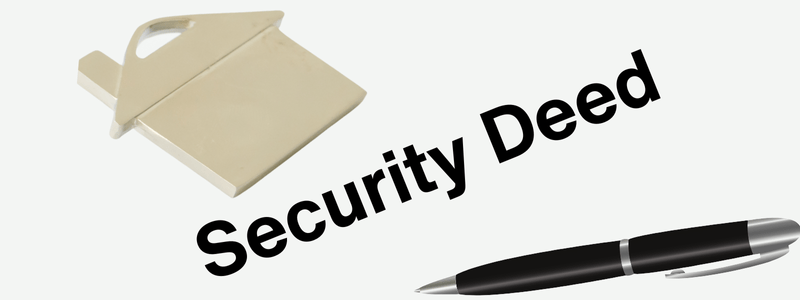
When purchasing property, you’ll likely encounter several confusing terms and legal jargon. One such term is a security deed, which plays a critical role in protecting your finances as a homeowner or property investor. Understanding a security deed and how it works can help you confidently navigate property ownership and secure your financial interests.
What is a Security Deed?
A security deed sometimes called a deed to secure debt, is a legal document used in real estate transactions, particularly in certain states such as Georgia. It serves as a promise that the borrower (the homeowner) will repay the lender (typically a bank or financial institution) for the funds loaned to purchase the property.
In simpler terms, the security deed allows the lender to hold legal title to the property until the loan is fully repaid, giving them security in case the borrower defaults. While the borrower lives in the property and holds equitable title (the right to use and benefit from it), the legal ownership remains with the lender until all terms are met.
The Role of a Security Deed in Real Estate
The primary role of a security deed is to secure the lender’s investment. When a borrower takes out a loan to buy a property, the security deed acts as a safety net for the lender. If the borrower defaults, the lender can take possession of the property through foreclosure, using it to recover their losses.
This legal document ensures that the lender has priority rights over the property in case of non-payment, giving them the legal leverage needed to recover the funds.
Key Parties Involved in a Security Deed
There are typically two main parties involved in a security deed:
- The Borrower (Grantor): The person taking out the loan, who agrees to provide the property as security for the debt.
- The Lender (Grantee): The financial institution or individual who loans the money, securing their interest in the property.
In some cases, there may also be a trustee involved, depending on the specific state laws. The trustee acts as a neutral third party who holds the title until the debt is repaid.
Grantor vs. Grantee: Understanding the Roles
The grantor is the borrower, meaning the person purchasing or owning the property, while the grantee is the lender or entity providing the funds for the purchase. It’s essential to understand the distinction between these roles, as each comes with different responsibilities. The grantor is responsible for repaying the loan on time, while the grantee ensures that the property remains under lien until the loan is repaid in full.
How a Security Deed Protects Your Finances
One of the key benefits of a security deed is the financial protection it offers. For lenders, it acts as a fail-safe, ensuring that they can reclaim the property if the borrower defaults. For borrowers, it provides a structured and legally clear way to finance a home or investment property, ensuring they can build equity while still benefiting from the property.
Additionally, having a security deed in place can help borrowers qualify for loans with lower interest rates, as it gives lenders confidence in the collateral.
Security Deed vs. Mortgage: Key Differences
While a security deed and a mortgage may sound similar, they have key differences:
- Legal Structure: With a security deed, the lender holds the title until the loan is paid off. In contrast, with a mortgage, the borrower holds the title, but the lender has a lien on the property.
- State-specific Distinctions: Security deeds are used in states like Georgia, whereas mortgages are more common nationwide.
- Lien vs. Title: In a mortgage, the lender has a lien on the property but does not hold the title, while in a security deed, the lender has actual legal ownership until the debt is repaid.
How to Secure a Property Using a Security Deed
The process of securing a property with a security deed involves several key steps:
- Loan Application: The borrower applies for a loan from a lender.
- Property Valuation: The property is appraised to ensure its value sufficiently covers the loan.
- Documentation: The security deed is drafted and signed, transferring the legal title to the lender.
- Repayment Schedule: The borrower agrees to a repayment plan, and as long as payments are made, the borrower retains the equitable title.
What Happens if You Default on a Security Deed?
If a borrower defaults on their payments, the lender has the right to foreclose on the property. This means they can take legal action to sell the property and recoup the funds from the sale to cover the outstanding debt. Foreclosure laws vary by state, so it’s important to know your rights and obligations.
Legal Implications of a Security Deed
A security deed legally transfers the title of the property to the lender. This transfer remains until the borrower has fulfilled all payment obligations. However, the borrower still retains the right to use the property, referred to as equitable title. If disputes arise, there are legal remedies for both parties, such as court intervention or mediation.
Can You Cancel or Modify a Security Deed?
You can modify or cancel a security deed by refinancing the loan or paying off the balance in full. In some cases, borrowers may seek to renegotiate terms, but this typically requires lender approval.
Security Deeds and Your Credit Score
Like other loan agreements, a security deed will appear on your credit report. Making consistent, on-time payments can help improve your credit score, while missed payments or foreclosure can negatively impact your credit.
Benefits of a Security Deed for Borrowers
For borrowers, a security deed offers several benefits:
- Lower Interest Rates: Because the property acts as collateral, lenders may offer lower rates.
- Easier Access to Financing: Having a security deed in place can make it easier to qualify for larger loan amounts.
Common Misconceptions about Security Deeds

Some borrowers confuse security deeds with mortgages, but as we’ve seen, there are distinct differences. Additionally, many assume that the lender immediately takes control of the property. However, the borrower maintains the right to live in and use the property as long as payments are made.
Conclusion
Understanding the role and function of a security deed is vital for anyone looking to purchase property. It provides essential protection for both lenders and borrowers, safeguarding their investments. If you’re considering buying property, seeking advice from a legal or financial advisor is crucial. They can help you fully grasp how a security deed operates and its implications for your financial future.
FAQs
1. What is the primary difference between a security deed and a mortgage?
A security deed gives the lender the title to the property until the loan is repaid, while a mortgage provides the lender with a lien on the property without transferring the title.
2. Can I sell my property if there is a security deed on it?
Yes, but you must pay off the loan in full before the sale is completed, or the lender must agree to transfer the deed to the new owner.
3. How does a security deed affect refinancing?
Refinancing can involve a new security deed, and the original deed may be canceled once the previous loan is paid off.
4. What should I do if I am facing foreclosure?
Contact your lender immediately to explore options such as loan modification or refinancing to avoid foreclosure.
5. Is a security deed used in all states?
No, security deeds are primarily used in certain states like Georgia, while other states use mortgages or deeds of trust.
To gain a deeper understanding of the various aspects of finance, including its types and importance, check out our article on What Is Finance? Types and Importance of Finance.
